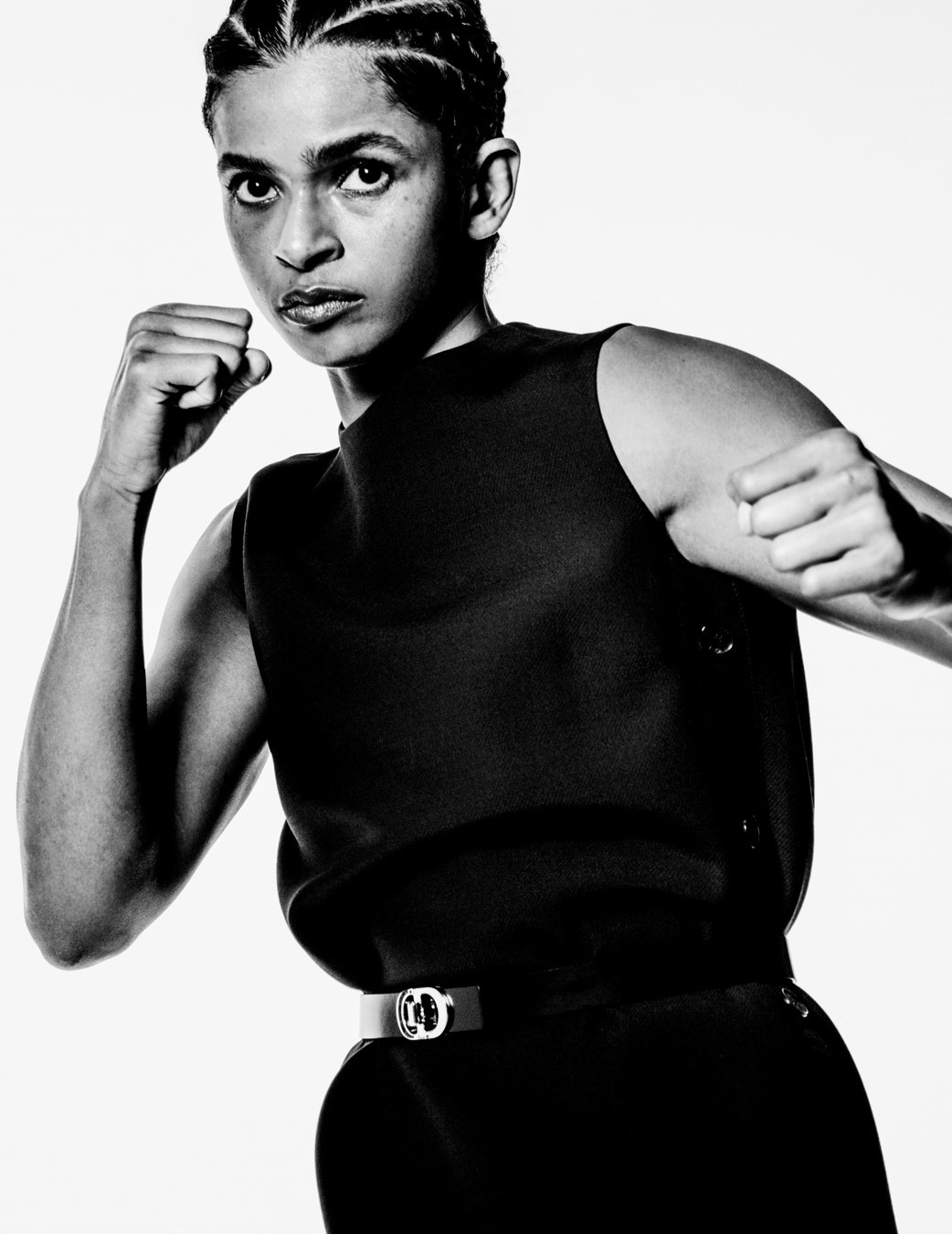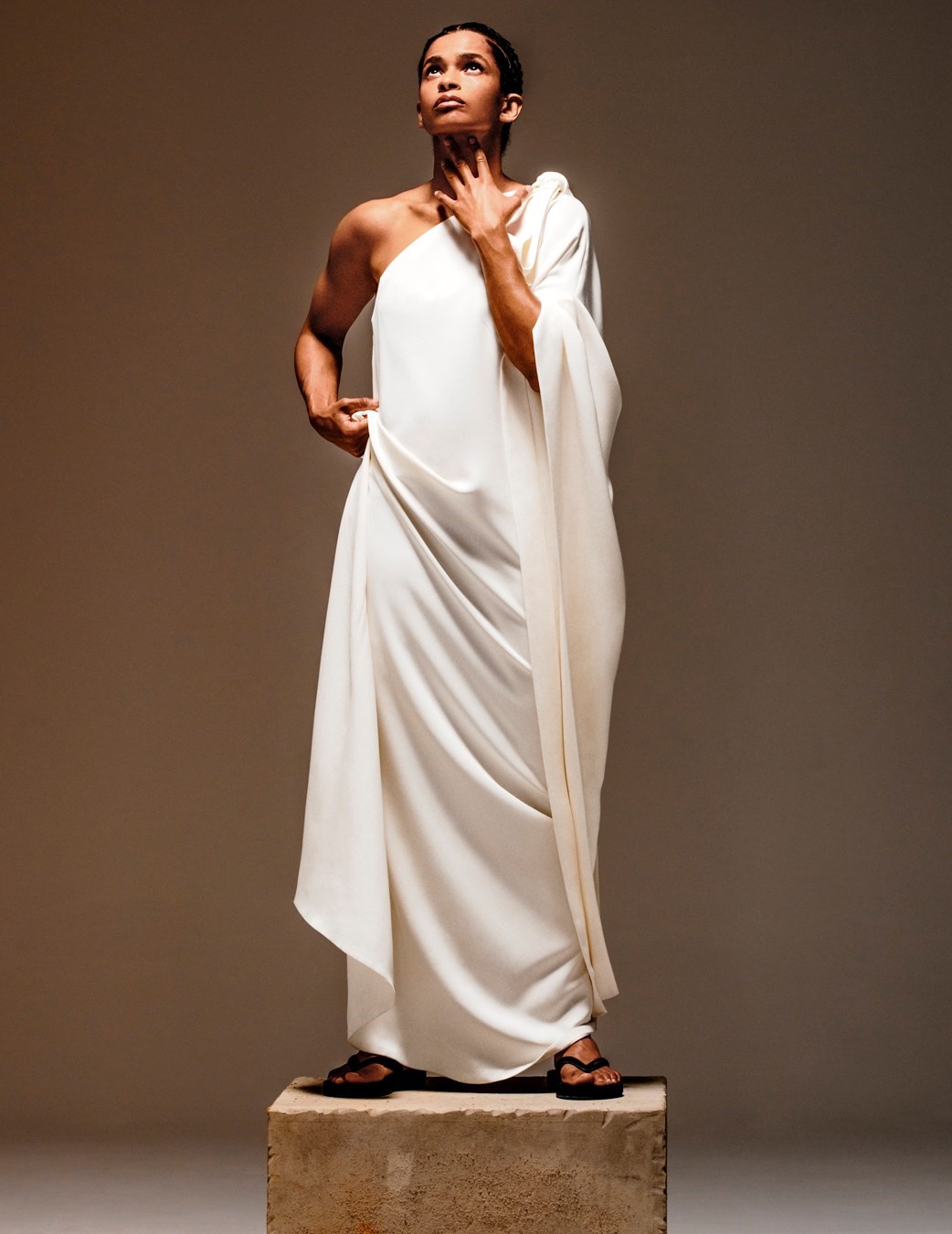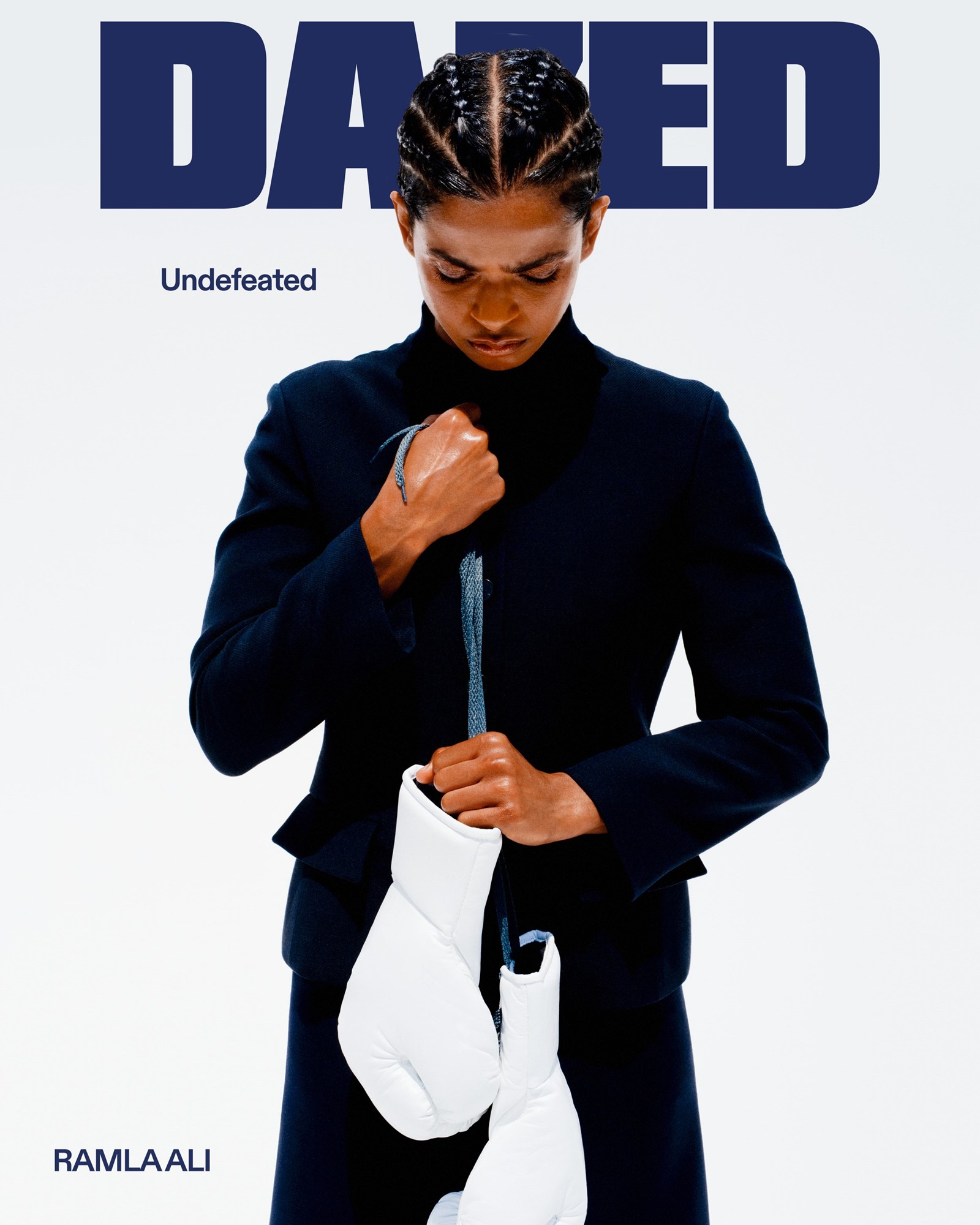On March 8, 2023, professional boxer Ramla Ali sent a letter to UK prime minister Rishi Sunak. The text, which she shared publicly on her Instagram, read like more of a blow-by-blow takedown, with all the cool, detached ferocity of one of her fights. “Your legacy is already one that is marred by greed and selfishness,” Ali wrote. “[Your] plans are hurtful, cruel, immoral and ineffective and I will not stay silent on this matter.”
Ali was referring to the Conservative party’s widely condemned illegal migration bill, which – at the time of writing – is nearing the final stages of approval in parliament. If it becomes law, the UK would effectively be banning asylum, leaving refugees without even the most basic of human rights. Its passage has been accompanied by a creeping sense of foreboding in the country, a malignant shadow growing in the national psyche. Just weeks before Ali’s letter was written, for example, hundreds of violent far-right protesters in Knowsley, Merseyside – a region that was once the beating heart of UK leftism – threw missiles at a hotel that was housing asylum seekers. A few months earlier, a far-right terrorist threw petrol bombs into a migrant processing centre in Dover in an attempt to “obliterate Muslim children”. Meanwhile Sunak’s government has been ramping up the anti-migrant rhetoric: refugees aren’t desperate people fleeing war and torture, according to home secretary Suella Braverman, they are an “invasion” of “criminals” coming to destroy Britain’s cultural identity.
Somali-born Ali was obviously never going to stay silent. By now, the 33-year-old’s story has been well-documented: after her 12-year-old brother was killed in the Somali civil war, her family was forced to flee the country. Ali arrived in the UK via a small boat when she was less than a year old, nearly dying in the process, and settled in east London. She went on to discover boxing as a teenager, quickly drawing attention for her style and tenacity, becoming an ambassador for Cartier and Christian Dior and having her robes specially designed by Off-White. Ali’s fighting spirit wasn’t just confined to the boxing ring, either: a Unicef ambassador and fierce advocate for human rights, she started free weekly London boxing classes for vulnerable women, The Sisters Club, in 2018.
When we speak over Zoom, Ali is on the sofa of her sun-drenched Los Angeles living room. She has been living in the city since January 2022, leaving the pervasive dread of Britain behind to train under the legendary Compton-based boxing coach Manny Robles. The schedule is a testament to her drive: she is pushing herself to her limits six days a week, twice a day. “Boxing is not forever, so I’m just going to stomach it,” she says, with characteristic nonchalance. “As Muhammad Ali once said, suffer now and live the rest of your life as a champion.
How do you feel about being British? What’s your relationship to that word?
Ramla Ali: I’ve always felt British, it’s the only home I’ve ever known. I like to embrace being Somali as well, but it can be a bit detrimental to my sporting career because the media see that as me not embracing being British. But I feel like I can be both. And people just don’t understand that – they think you have to be one or the other, you have to choose.

I’ve noticed that you’re never just written about as a boxer; it’s always ‘female Muslim former refugee boxer’, like there’s this compulsion to label or categorise you.
Ramla Ali: I don’t understand where that all came from. And the horrible thing is, if you’re losing, you’re a Somali-born former refugee. But if you’re winning, you’re a British boxer. It’s bizarre. It’s like, why can’t you have my back when I’m losing as well?
You went to school in east London, and you’ve spoken before about being bullied there. How do you feel about that time now?
Ramla Ali: Girls’ schools are the worst. It was just so bitchy, and for a lot of my teenage years I was bullied for being overweight. I was brave enough to talk about it in articles, but I had people from my secondary school contact me on social media after saying, ‘You were never bullied!’ But I was – I’m not just making it up for clout. People don’t understand that there are different forms of bullying: there can be physical, there can be emotional, there can be mental. I wasn’t getting shoved in the locker or my head flushed down the toilet, but it was very emotional. They made fun of my weight, what I wore, how I smelled, the fact that I was wearing the same clothes all the time. Obviously, they weren’t necessarily understanding my upbringing: we were refugees and we didn’t have a lot of money, so I didn’t have the same luxury as everybody else, like going to Topshop and buying the latest things. I always had to wear my sister’s hand-me-downs. It was a very emotional five years in secondary school, and I think kids are always mean; they don’t understand that it’s the difference in this world that makes it interesting. If everybody was the same, life would be boring.
Why do you think boxing was such a lifeline for you at that time?
Ramla Ali: I walked into the gym when I was 12. It was one of these massive gyms, very intimidating, and there were a lot of men pumping iron. I was overweight, very body-conscious, and I just thought, what do I do? So I went to the very first class, which was boxercise, and I loved it – and that was that! I could have walked into a spin class and become a cyclist. I loved that I didn’t have to think for myself – I didn’t know the first thing about the gym and somebody was telling me what to do. I was working out and getting healthy at the same time. My body was changing; I was getting more confident.
“If you’re losing, you’re a Somali-born former refugee. But if you’re winning, you’re a British boxer. It’s bizarre” – Ramla Ali
Is that why you started Sisters Club, to help women navigate those spaces?
Ramla Ali: There are not a lot of women that can be confident enough to walk into a gym full of men and just be like, ‘I’m going to work out today.’ Especially because nowadays you get so much unwanted attention: a woman can be working out and a man will come up to her and be like, ‘You’re not doing this properly.’ It’s like, dude, I didn’t ask for your opinion, piss off! There’s a reason I’ve got my headphones in. So Sisters Club was created based on that, to give women the opportunity to feel safe enough to work out and learn boxing properly, and to just create this bond of sisterhood.
Your personal journey into boxing was very stop-start – you studied law at SOAS before finally pursuing the sport professionally, right? Why were you so unsure?
Ramla Ali: Ever since we came to the UK my mum has been like, education, education, education. So me and all my siblings went to school, we did well, we got degrees. I have a brother who’s a doctor, two sisters who are nurses and another one who’s going to be a physio. My oldest brother got a very cool degree in artificial intelligence. I didn’t really care about going to university; I just wanted to be a boxer, and I only agreed to go to as a compromise to my mum. My whole boxing career has been stop-start because of my parents. My mum is so supportive now, but she said that she took us all away from danger in Somalia, and [by boxing] I was essentially putting myself back into danger. And I never thought of it like that. I just thought she was stopping me because I was a girl: a Somali girl, Muslim girl, whatever. And she was like, nah, it’s got nothing to do with that; you’re just my child and I want to keep you safe.
What are your feelings on Britain at the moment? Why did you want to write that letter to Rishi Sunak?
Ramla Ali: It’s the worst time to be a displaced person. Me and my family were fortunate enough to come to the UK at a time when we were welcome – a bit. And because of how open Britain was back then, we were allowed to flourish. Yes, I’ve got a law degree that I don’t use, but I still have that degree, and all my siblings are educated and contribute to the economy. During the pandemic, they were volunteering on top of the 40 hours a week that they already were doing: my sister would only sleep three hours before having to go back to work because the hospitals were crazy. The government is just assuming that people are coming to the UK to claim benefits – but what is it, like, £50 a week? You’re telling me that people are going to leave what they know back home to come for £50 a week? When we were in Somalia, my dad was a teacher and my mum had a very successful business, so we were very well off. A lot of these people are in the same situation: they’re not leaving all of that to sponge off the economy, they’re leaving because it’s dangerous for them to stay where they are. The fact that the government is saying that they’re putting a huge strain on the economy? It’s just absolute bullshit.

Do you feel frustrated that you have to justify your education, your contribution to society? To be the ‘good immigrant’?
Ramla Ali: Yeah, it’s like you have to justify allowing immigrants to come into the country and show them that we’re good people. You can’t just be a human being, you have to show them that we’re doing good for the country, that we’re paying our taxes. It’s crazy. The state of the country is a bit shit. But one thing I’ve always said is, London should be its own country. London is not like any other part of the UK; it’s an amazing place to be, very multicultural. It’s what the world should be like, I think.
‘Stop The Boats’ is a big political slogan at the moment, and obviously that’s how you got here. What do you remember about your journey, and what do you wish people knew about boat crossings?
Ramla Ali: My boat crossing was a bit mad. The boat was meant to carry only 200 people, but around 500 people got on because everybody was trying to flee. So we got on at the coast of Kismayo in Somalia and travelled to Mombasa in Kenya, but I had contracted head lice on the boat and obviously – bro science – somebody suggested to my mum that she put rat poison in my head to kill the lice. And so she did, and I got really sick and she thought I was going to die, and then someone else suggested [making] me throw up. So she gave me water and milk and all the liquids to make me throw it all up, which I did. So my boat journey wasn’t the best. A lot of people passed away, and a lot of people died on the journey. This is the reality of it. This is what happens. People have to go through that because they’re trying to create a better life for themselves, for their family, for their kids.
“London should be its own country. London is not like any other part of the UK; it’s an amazing place to be, very multicultural. It’s what the world should be like”
A movie is currently being made of your life, starring Letitia Wright. How do you feel about that?
Ramla Ali: So many people approached me for the rights, and we weren’t really interested. I wasn’t really interested in having a movie made about me; I felt really exposed. But it was [The Favourite co-producer] Lee Magiday who put in the graft. She approached me back in 2016 and stuck it out, she knew what she wanted. She obviously wanted it really bad, so I know she’s going to do a really good job of it; she’s going to do it justice. Letitia has been in LA with me the last couple of days, just getting to know me and to see how training is. She’s like, rah, you do this every day? Like, when do you rest? But everybody’s been loving having her in the gym. She’s really cool.
What’s your big dream? What would you love to achieve in the next few years?
Ramla Ali: My big dream is to become a world champion in professional boxing. There are four governing bodies to be a world champion in, and my goal is to be the world champion in at least two of them, and then move down in weight class. So I compete now as a super bantamweight, and I’m hoping to go down to bantamweight. That’s the goal. But should Somalia turn around and say, ‘Yo, we’re paying for you to go to the Olympics,’ I wouldn’t say no. But I can’t fork the money out myself again, which is what I did at the Tokyo Olympics [in 2021]. I was having to do shoots and modelling in order to pay for tournaments and training camps, which really affected my training. I wasn’t able to fully focus because I had to make money to pay for flights and everything. It was too much. I would also love to go to Somalia and build a gym that can do Sisters Club classes for women. That would be a dream, for sure.
Hair RACHEL LEE at MA+ using ORIBE, make-up HOLLY SILIUS using DIOR BEAUTY, nails RACHEL MESSICK, set design DANIEL HOROWITZ at JONES, photographic assistants JACK BUSTER, DAVID GURZHIEV, hair assistant CARISA ARELLANO, make-up assistant NATALIE TCHOKREFF, set design assistant GEOFF SMYSER, digital operator TARA DEVOTI, production CLM
Join Dazed Club and be part of our world! You get exclusive access to events, parties, festivals and our editors, as well as a free subscription to Dazed for a year. Join for £5/month today.








